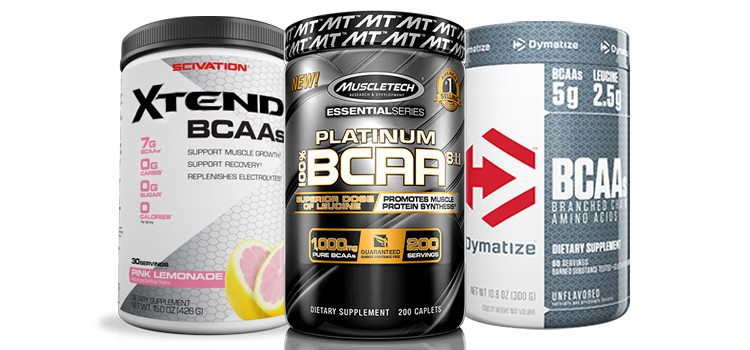
If you’re loyal to any supplement brand, odds are that they have a branched chain amino acid (BCAA) product in their line. One of the pioneers of BCAA supplementation was a company called Scivation with their product Xtend (horrible name by the way). The product is still an industry leader and one of the best sellers in that category.
The three branched chain amino acids are leucine, isoleucine, and valine. Collectively, a BCAA supplement will typically have 5-10 grams of these aminos. There are numerous touted benefits to BCAA supplementation like increased muscle building (anabolism), muscle recovery, and workout endurance. But lately these have been called into question, coupled with the rise in popularity of essential amino acid (EAA) supplements.
As a consumer, it’s important to know the legitimacy of the claims on products you’re buying. This is particularly important with dietary supplements, as sports nutrition marketing can be a bit… exaggerated.
Below you will find out what branched chain amino acids do, but perhaps more importantly, what they don’t.
Protein Synthesis and Protein Breakdown
Before going into the specifics of BCAAs and muscle growth, it’s important to understand how muscle is built. On the surface, which is all we need to know for the sake of this article, the process is pretty basic.
The body is going through two completely separate processes at all times, protein synthesis (muscle growth) and protein breakdown (muscle degradation). It is not as if you are either building muscle or losing muscle, they are technically both happening simultaneously. If you want to build muscle, you need the rate of protein synthesis to exceed the rate of protein breakdown as often as possible.
Are BCAAs Anabolic
The key amino acid when it comes to anabolism is leucine. Leucine has been shown to increase levels of protein synthesis. This would lead you to believe that it would automatically make leucine, and BCAAs in general, anabolic. But this is not the case.
There are twenty different amino acids used to build new muscle protein. Eleven are considered non-essential, which means the body can synthesize them on its own. Nine are essential, which means they must be consumed in our diet.
If leucine is taken without the other eight essential amino acids, the elevation in protein synthesis is basically useless. The body will actually take essential amino acids from other muscles to compensate for what is lacking when just supplementing with leucine or BCAAs. The net gain is zero. It’s like stripping lumber from one perfectly good house to build a new one. In the end you still have the same amount of houses in the neighborhood.
Essential Amino Acids
Knowing this, it’s easy to see how BCAA supplementation kind of defeats the purpose if the primary goal is to build muscle. What good is having three amino acids, even if you technically increase protein synthesis, if the other six are lacking and the body has to tap into its own reserves? Enter essential amino acids.
There are many quality essential amino acid supplements which contain adequate doses of all nine aminos needed to build muscle. This still includes the three BCAAs, but now you have the entire spectrum.
Someone playing devil’s advocate may ask; why not just have a whey protein shake? It’s a fair argument, as whey too would have all the essential amino acids. But you have to consider the context. 99% of people take BCAAs during their workout. Most people don’t consume shakes intra-workout since it sits in their stomach in an uncomfortable way and impairs workout performance. Essential amino acid supplements digest very quickly and easily, which makes them more appropriate to use intra-workout.
Are BCAAs Good for Anything
BCAAs are not completely useless. There are numerous studies that suggest they are helpful in alleviating muscle soreness (DOMS) from workouts. With this in mind you could say that it also helps with overall recovery, since most people associate recovery with how sore they feel the next day.
Another proposed benefit of BCAAs that you’ll often find on the front of product labels is enhanced muscular endurance. This is true to a certain extent, but vastly overrated. In dire situations, the body will turn to amino acids for energy. However, they are not a preferred fuel source, nor a very efficient one to begin with.
It takes a great deal of work to extract energy from amino acids. It is often called an “energy expensive” process, since it requires a lot of ATP to get a small result. This is why the body prefers carbohydrates or fats (carbs in particular) for energy. If your workouts are exceptionally long you may resort to amino acids for energy, but this can be mitigated by simply eating beforehand or supplementing with a carbohydrate drink during.
Looking at things practically, BCAA supplementation doesn’t make a lot of sense when there are tons of EAA supplements available. Again, EAA supplements include BCAAs. The only argument would be that EAA supplements are more expensive. But in my opinion, why spend less money on a subpar product that has limited function? Even if you could afford it say half the time, it’s better than using a BCAA product that won’t do much for you.
References
Ra SG, Miyazaki T, Kojima R, et al. Effect of BCAA supplement timing on exercise-induced muscle soreness and damage: a pilot placebo-controlled double-blind study. J Sports Med Phys Fitness. 2018;58(11):1582-1591. doi:10.23736/S0022-4707.17.07638-1
